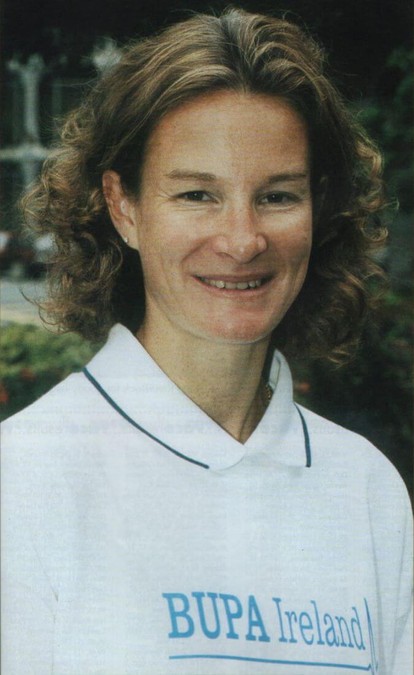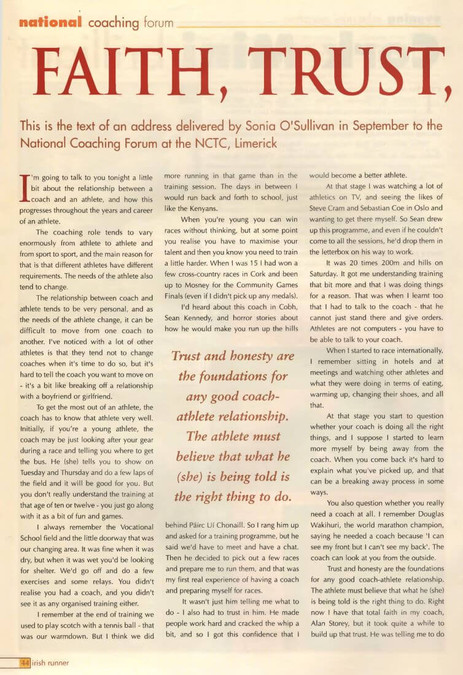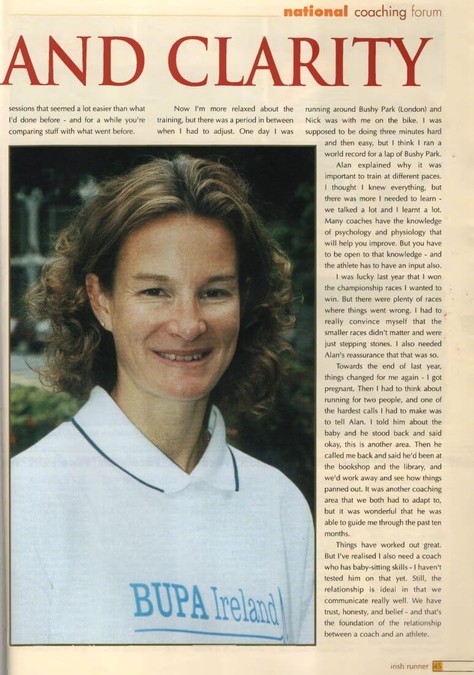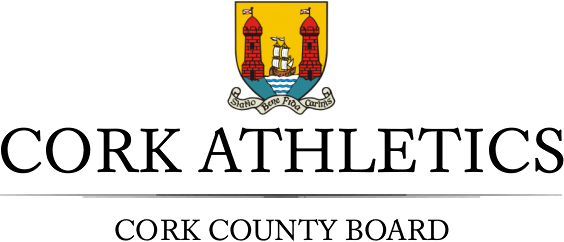Sonia O'Sullivan Address to National Coaching Forum - September 1999
FAITH, TRUST, AND CLARITY
National Coaching Forum, NCTC, Limerick
September 1999

This is the text of an address delivered by Sonia O'Sullivan in September to the National Coaching Forum at the NCTC, Limerick
This article was published in The Irish Runner, Vol 19, No 5, P 44-45, October/November 1999
 |  |
| Text of Sonia O'Sullivan's address to the National Coaching Forum, September 1999 Printed in The Irish Runner, Vol 19, No 5, P 44-45, October/November 1999 | |
I'm going to talk to you tonight a little bit about the relationship between a coach and an athlete, and how this progresses throughout the years and career of an athlete.
The coaching role tends to vary enormously from athlete to athlete and from sport to sport, and the main reason for that is that different athletes have different requirements. The needs of the athlete also tend to change.
The relationship between coach and athlete tends to be very personal, and as the needs of the athlete change, it can be difficult to move from one coach to another. I've noticed with a lot of other athletes is that they tend not to change coaches when it's time to do so, but it's hard to tell the coach you want to move on - it's a bit like breaking off a relationship with a boyfriend or girlfriend.
To get the most out of an athlete, the coach has to know that athlete very well. Initially, if you're a young athlete, the coach may be just looking after your gear during a race and telling you where to get the bus. He (she) tells you to show on Tuesday and Thursday and do a few laps of the field and it will be good for you. But you don't really understand the training at that age of ten or twelve - you just go along with it as a bit of fun and games.
I always remember the Vocational School field and the little doorway that was our changing area. It was fine when it was dry, but when it was wet you'd be looking for shelter. We'd go off and do a few exercises and some relays. You didn't realise you had a coach, and you didn't see it as any organised training either.
I remember at the end of training we used to play scotch with a tennis ball - that was our warmdown. But I think we did more running in that game than in the training session. The days in between I would run back and forth to school, just like the Kenyans.
When you're young you can win races without thinking, but at some point you realise you have to maximise your talent and then you know you need to train a little harder. When I was 1 5 I had won a few cross-country races in Cork and been up to Mosney for the Community Games Finals (even if I didn't pick up any medals).
Trust and honesty are the foundations for any good coach-athlete relationship. The athlete must believe that what he (she) is being told is the right thing to do.
I'd heard about this coach in Cobh, Sean Kennedy, and horror stories about how he would make you run up the hills behind Pairc Ui Chonaill. So I rang him up and asked for a training programme, but he said we'd have to meet and have a chat. Then he decided to pick out a few races and prepare me to run them, and that was my first real experience of having a coach and preparing myself for races.
It wasn't just him telling me what to do - I also had to trust in him. He made people work hard and cracked the whip a bit, and so I got this confidence that I would become a better athlete.
At that stage I was watching a lot of athletics on TV, and seeing the likes of Steve Cram and Sebastian Coe in Oslo and wanting to get there myself. So Sean drew up this programme, and even if he couldn't come to all the sessions, he'd drop them in the letterbox on his way to work.
It was 20 times 200m and hills on Saturday. It got me understanding training that bit more and that I was doing things for a reason. That was when I learnt too that I had to talk to the coach - that he cannot just stand there and give orders. Athletes are not computers - you have to be able to talk to your coach.
When I started to race internationally, I remember sitting in hotels and at meetings and watching other athletes and what they were doing in terms of eating, warming up, changing their shoes, and all that.
At that stage you start to question whether your coach is doing all the right things, and I suppose I started to learn more myself by being away from the coach. When you come back it's hard to explain what you've picked up, and that can be a breaking away process in some ways.
You also question whether you really need a coach at all. I remember Douglas Wakihuri, the world marathon champion, saying he needed a coach because 'I can see my front but I can't see my back'. The coach can look at you from the outside.
Trust and honesty are the foundations for any good coach-athlete relationship. The athlete must believe that what he (she) is being told is the right thing to do. Right now I have that total faith in my coach, Alan Storey, but it took quite a while to build up that trust. He was telling me to do sessions that seemed a lot easier than what I'd done before - and for a while you're comparing stuff with what went before.
Now I'm more relaxed about the training, but there was a period in between when I had to adjust. One day I was running around Bushy Park (London) and Nick was with me on the bike. I was supposed to be doing three minutes hard and then easy, but I think I ran a world record for a lap of Bushy Park.
Alan explained why it was important to train at different paces. I thought I knew everything, but there was more I needed to learn - we talked a lot and I learnt a lot. Many coaches have the knowledge of psychology and physiology that will help you improve. But you have to be open to that knowledge - and the athlete has to have an input also.
I was lucky last year that I won the championship races I wanted to win. But there were plenty of races where things went wrong. I had to really convince myself that the smaller races didn't matter and were just stepping stones. I also needed Alan's reassurance that that was so.
Towards the end of last year, things changed for me again - I got pregnant. Then I had to think about running for two people, and one of the hardest calls I had to make was to tell Alan. I told him about the baby and he stood back and said okay, this is another area. Then he called me back and said he'd been at the bookshop and the library, and we'd work away and see how things panned out. It was another coaching area that we both had to adapt to, but it was wonderful that he was able to guide me through the past ten months.
Things have worked out great. But I've realised I also need a coach who has baby-sitting skills - I haven't tested him on that yet. Still, the relationship is ideal in that we communicate really well. We have trust, honesty, and belief - and that's the foundation of the relationship between a coach and an athlete.












